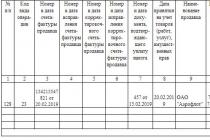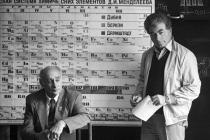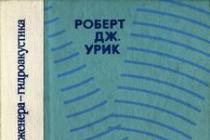The head of our company sent employees on a business trip in 2016. After the end of the business trip, reporting documents were provided to the company’s accounting department confirming travel expenses, namely railway tickets, which are BSO. The ticket shows a price of 6,298 rubles, including VAT of 630 rubles. The allocated VAT amount in the ticket is not subject to the rate of either 10% or 18%, the percentage of the rate is not indicated in the ticket and there is no way to calculate the amount, and no explanations are attached. We are also aware of changes in tax laws. According to paragraphs. 7 paragraph 2 art. 164 of the Tax Code of the Russian Federation, starting from January 1, 2016, taxation is carried out at a tax rate of 10% for the sale of services for the transportation of passengers and luggage by public railway transport in long-distance traffic. How to account for VAT on tickets from 01/01/2016?
When considering issues of VAT calculation, it is necessary to be guided by the norms of Chapter 21 of the Tax Code of the Russian Federation.
According to paragraph 7 of Art. 171 of the Tax Code of the Russian Federation, amounts of value added tax paid on travel expenses to and from the place of a business trip, accepted for deduction when calculating corporate income tax, are subject to deductions.
Clause 1 of Art. 172 of the Tax Code of the Russian Federation establishes that tax deductions provided for in Art. 171 of the Tax Code of the Russian Federation, are made on the basis of invoices issued by sellers when the taxpayer purchases goods (work, services), or on the basis of other documents in the cases provided for in paragraphs 3, 6−8 of Art. 171 of the Code. According to clause 18 of the Rules for maintaining a purchase book used in calculations of value added tax, approved. By Decree of the Government of the Russian Federation of December 26, 2011 No. 1137, when purchasing services for the rental of residential premises during a business trip of employees and services for transporting employees to the place of business trip and back, including services for the provision of bedding for use on trains, invoices are registered in the purchase ledger - invoices or strict reporting forms filled out in the prescribed manner or copies thereof with the amount of value added tax highlighted on a separate line, issued to the employee and included by him in the business trip report.
The forms of transportation documents for railway transport as strict reporting forms are approved by Order of the Ministry of Transport of Russia dated 05.08.2008 No. 120.
Thus, a travel document (ticket), in which the tax amount is highlighted as a separate line, is the basis for deducting VAT paid on travel services to and from the place of business travel (the points of departure and destination of which are located on the territory of the Russian Federation). This position is confirmed by regulatory authorities (see Letters of the Ministry of Finance of Russia dated September 21, 2012 No. 03-07-11/393, dated January 10, 2013 No. 03-07-11/01).
At the same time, tax legislation does not establish the obligation of the buyer of services to check the amount of VAT allocated in the ticket using the calculation method.
We assume that the ticket you presented has a total cost of 6,298 rubles. includes not only the cost of transportation services, taxed at a rate of 10% from January 1, 2016 (clause 7, clause 2, article 164 of the Tax Code of the Russian Federation), but also other amounts, for example:
. provision of bedding - VAT rate 18% (clause 3 of Article 164 of the Tax Code of the Russian Federation),
. food - VAT rate 18% (clause 3 of Article 164 of the Tax Code of the Russian Federation),
. insurance fee is not subject to VAT (clause 7, clause 3, article 149 of the Tax Code of the Russian Federation).
It should be noted that the law does not establish the obligation of the service provider to indicate the VAT rate on the ticket.
Taking into account the above, we consider the allocated amount of VAT on the ticket (630 rubles) that you have the right to deduct. VAT deduction from the cost of travel on a business trip is made in the tax period, not earlier than the date of approval of the advance report (see Letters of the Ministry of Finance of the Russian Federation dated September 21, 2012 No. 03-07-11/393). In this case, your organization may (is not obligated to) request a breakdown of tariffs from the carrier.
Accounting for ticket costs has a number of features, which we will try to outline on this page.
A ticket, contrary to the established stereotype, is not a product. According to Art. 786 of the Civil Code of the Russian Federation, a ticket is a document certifying the conclusion of a contract for the carriage of a passenger. Currently, “electronic tickets” - tickets in paperless form - are becoming increasingly widespread. More than 90% of air tickets and already a significant part of railway tickets are issued in this form.
For income tax purposes expenses for paying the employee's travel costs to the place of business trip and back are taken into account in the amounts confirmed by the travel document. (Letter of the Ministry of Finance of the Russian Federation dated January 10, 2013 No. 03-07-11/01).
The procedure for writing off expenses for the purchase of electronic tickets is established in the letter of the Federal Tax Service of Russia dated October 12, 2012 No. AS-4-2/17308. “If the air ticket was purchased in undocumented form (electronic ticket), then supporting documents confirming the expenses for purchasing an air ticket for tax purposes, are generated by an automated information system for registration of air transportation route/receipt of an electronic document (air ticket) on paper, which indicates the cost of the flight, boarding pass, confirming the flight of the accountable person on the route specified in the electronic ticket.
A document confirming expenses incurred for purchasing a train ticket, is control coupon of an electronic travel document (ticket), received electronically via an information and telecommunications network.”
The cost of tickets is taken into account as part of travel expenses on the basis of subparagraph 12 of paragraph 1 of Article 264 of the Tax Code of the Russian Federation.
The organization can also write off as expenses and costs of paying remuneration to the intermediary organization (agency). The letter of the Federal Tax Service for Moscow dated July 1, 2010 No. 16-158/069225 states that the costs of paying remuneration to an intermediary organization are not included in travel expenses and, when determining the amount of expenses that reduce the income of the current reporting (tax) period, are taken into account by the organization - by the customer separately. The basis for such accounting is an intermediary agreement with the selling organization and documents confirming the fact of payment for the services of the intermediary.
It should be especially noted that in accordance with clause 9 of the Regulations on maintaining accounting and financial reporting in the Russian Federation, approved by Order of the Ministry of Finance of Russia dated July 29, 1998 N 34n “On approval of the Regulations on maintaining accounting and financial reporting in the Russian Federation”, documentation of property, obligations and other facts of economic activity, accounting registers and financial statements are maintained in Russian. Primary accounting documents compiled in other languages must have a line-by-line translation into Russian. The need to translate travel documents into Russian is established in letters of the Ministry of Finance of the Russian Federation dated March 24, 2010 No. 03-03-07/6 and dated April 20, 2012 No. 03-03-06/1/202, which also states that such a translation can be made both a professional translator and a specialist from the organization itself.
VAT accounting , paid when purchasing tickets for employees of organizations, also has a significant difference from the procedure for accounting for VAT on goods and services purchased by the organization.
In cases where the VAT amount is not highlighted as a separate line on the ticket, the entire amount indicated on the ticket is included in other expenses associated with production and sales, on the basis of subclause 12 of clause 1 of Article 264 of the Tax Code. This accounting procedure is established in the letter of the Ministry of Finance of the Russian Federation dated January 10, 2013 No. 03-07-11/01.
The full texts of the documents mentioned in this section can be found using the links in the list below.
In 2019, there will be a zero VAT rate on railway and air tickets, but the tax on service services will remain the same. This will bring additional difficulties to accountants, since tickets usually indicate the total amount of tax. Let's figure out together what VAT rates on tickets will be in effect in the Russian Federation in 2019, how to deduct tax on tickets, how to reflect the purchase of a ticket in the purchase book, and what a company should do if a ticket was purchased through an intermediary.
From the article you will learn:
Is it possible to deduct VAT on air and train tickets in 2019?
VAT on Russian Railways tickets in 2019
Rate for air and train tickets
Tax on air tickets and railway tickets in 2019: how to reflect it in the purchase book
VAT on air and railway tickets in 2019: can it be deducted?
Many companies send their employees on business trips; upon return, the latter are required to report their expenses using strict reporting documents, including air and train tickets.
A reasonable question arises: is it possible to deduct VAT on tickets in 2019, for which in most cases no invoice is issued. The Ministry of Finance of the Russian Federation answered this question as follows: in order to deduct VAT from railway and air tickets, the ticket form (paper or electronic) must have a line with the specified tax amount. Otherwise, VAT cannot be deducted (letter dated 02.26.16 No. 03-07-11/11033).
But for services on a train ticket, it is not always safe to claim a deduction. We found out from the tax authorities how to correctly declare deductions so that they are not withdrawn. Look
How to include tickets with expenses
Consider the procedure for accounting for the cost of such tickets in expenses. So, if the ticket says “including VAT”, but the amount itself is not deciphered, usually accountants write off the entire cost of the ticket as expenses, in full. However, doing so is dangerous. It is necessary to determine VAT by calculation and exclude it from costs. If the ticket does not say anything about VAT, you can include the entire cost of the trip as expenses.
VAT on Russian Railways tickets in 2019
From January 1, 2017, the VAT rate on domestic transportation by rail decreased to 0%. The zero rate applies to the transportation of passengers and baggage both on commuter trains and long-distance trains (clause 9.2, clause 3, clause 1, article 164 of the Tax Code of the Russian Federation). However, additional services, including food, water, bed, and newspapers, are subject to a VAT rate of 18%.
In the letter “On the procedure for applying VAT rates in relation to the cost of services included in travel documents for the transportation of passengers and baggage by public railway transport in domestic traffic,” Russian Railways OJSC undertook to reflect VAT on tickets by rate. That is, the ticket must contain two lines with VAT amounts: separately VAT at a rate of 0% on passenger transportation and at a rate of 18% on additional fees and services.
If the ticket contains the total amount of VAT without details, the accountant may have difficulty accepting the tax for deduction, since VAT on the passenger’s meals cannot be taken into account. What should I do?
- Russian Railways was obliged to include VAT details on tickets, but to this day this is not always observed.
- Make a request to Russian Railways with a request to decipher the tax, but this will cost the company money.
- The Federal Tax Service allows you not to break down VAT in the purchase book, but to take it into account as a whole
- Most often, food is included in the cost of services, VAT on which can be deducted
In most cases, VAT can be deducted from Russian Railways tickets in 2019 without additional detail.
VAT rate for air and railway tickets
VAT when purchasing tickets through an agency in 2019
Very often, the purchase of air and train tickets occurs with the participation of an intermediary or agency, which adds their services to the cost of the ticket. When purchasing tickets through an agency in 2019, we deduct VAT in this order - and on the basis of the ticket (paper or electronic), in which VAT is indicated as a separate line, the company makes an entry in the purchase book and accepts the specified VAT for deduction.
Please note that the carrier, and not the intermediary or agency, must be indicated as the seller in the purchase book, since VAT paid for the transportation of a company employee is deductible.
If at the same time the intermediary or agency provides you with an invoice for their services with allocated VAT, then you have the right to determine this VAT to be deducted. In this case, in the purchase book you indicate the intermediary as the seller. If the intermediary did not issue an invoice, then you will not be able to accept VAT as a deduction for the agency’s services.
VAT on air and train tickets in 2019: how to reflect it in the purchase book
When a posted employee provides an air or railway (paper or electronic) or a receipt for the purchase of a ticket with the amount of VAT indicated on it, the company has the right to accept this VAT as a deduction if its activities are subject to VAT. To do this, you need to make an entry in the purchase book and reflect the document.
How to reflect to the purchase book?
- 1st column – number in order
- 2 columns - transaction code - regardless of the type of ticket, we always put 23
- Column 3 – seller’s invoice number - write the ticket number and the date of purchase of the ticket
- 4,5, 6 columns – put a dash
- Column 7 – number and date of the document confirming payment of tax – indicate the number and date of purchase of the ticket
- Column 8 – date of acceptance of goods for registration – corresponds to the date of the company’s advance report
- Column 9 – name of the seller – enter the name of the carrier indicated on the ticket (Russian Railways, JSC Aeroflot, JSC Siberian Airlines, etc.)
- Column 10 - INN/KPP of the seller - is almost never indicated on tickets, so you can put a dash, but if the INN is indicated in the travel document, then you should also indicate
- 11, 12, 13, 14 columns – put a dash
- Column 15 – purchase price according to the invoice – enter the cost of the ticket
- Column 16 – VAT amount on the invoice – enter the VAT amount indicated on the ticket
How to reflect VAT on an air ticket in 2019 in the purchase book, sample.

On the deduction of VAT on railway tickets from January 1, 2016, if the carrier does not allocate the cost of transportation itself and additional services according to separate tax rates and the VAT amount is indicated in a single line.
On January 1, 2016, the Federal Law of December 29, 2015 came into force. No. 386-FZ “On introducing amendments and additions to part two of the Tax Code of the Russian Federation”, according to which services for the transportation of passengers and luggage by public railway transport in long-distance traffic (throughout the territory of the Russian Federation) are subject to VAT at a rate of 10%. At the same time, additional services provided by the carrier (for example, meals) continue to be taxed at a general tax rate of 18%.
In practice, situations arise when the carrier indicates a single ticket price taking into account the cost of additional services), without dividing the cost of the ticket itself and additional services into separate tax bases and rates. In this regard, the accountant does not have the opportunity to determine by calculation the amount of VAT relating to the transportation itself (at a rate of 10%) and to additional services (at a rate of 18%). Therefore, the question arises whether the single amount of VAT allocated by the carrier in the ticket can be deducted.
To do this, let us turn to the provisions of Chapter 21 of the Tax Code of the Russian Federation and other regulations governing the procedure for deducting VAT on transportation services.
According to paragraph 1 of Art. 172 of the Tax Code of the Russian Federation, deductions of tax amounts are made on the basis of invoices issued by sellers when selling goods (work, services) to taxpayers of this tax, or on the basis of other documents in the cases provided for in paragraphs 3, 6 - 8 of Art. 171 Tax Code of the Russian Federation.
Based on clause 18 of the Rules for maintaining a purchase book used in calculations of value added tax, approved by the Decree of the Government of the Russian Federation dated December 26, 2011. No. 1137, when purchasing services for transporting employees to the place of a business trip and back, strict reporting forms filled out in the prescribed manner or copies thereof with the amount of value added tax highlighted in a separate line, issued to the employee and included by him in the report on the business trip, are registered in the purchase book.
Thus, the regulations do not contain an obligation to allocate VAT amounts at different tax rates in the ticket price for the purpose of VAT deduction. In addition, the norms of Chapter 21 of the Tax Code of the Russian Federation also do not require organizations to independently determine by calculation the amount of VAT on transportation services and additional services provided. This means that the basis for the deduction is the amount of VAT that is allocated by the carrier in the ticket (without indicating a particular VAT rate).
If employees of an organization often go on business trips, then the organization usually enters into an agreement with an agency that issues railway and air tickets. The intermediary issues an invoice with highlighted lines for tickets and service fees. Both tickets and service fees may be subject to VAT.
In accordance with paragraph 7 of Art. 171 of the Tax Code of the Russian Federation, a taxpayer can accept the amount of tax as a deduction if travel expenses are accepted for deduction for profit tax purposes. This includes the need for documentary evidence of expenses, namely a business trip order, confirmation of travel, etc., which usually arises when preparing an advance report. Therefore, VAT is deducted not in the period of receipt of tickets and the intermediary’s invoice, but in the period of preparation of the advance report, i.e. when all requirements for acceptance for deduction are met.
If an employee does not use the ticket for any reason, it will be returned. In this case, as a rule, the service fee is not refunded, and not the full cost of the ticket may be refunded as a fine. This procedure is described in the agreement with the agency, therefore, based on clause 3 of Article 168 of the Tax Code of the Russian Federation, the agency issues an adjustment invoice to the organization, which excludes or reduces the cost of the ticket. Based on the received adjustment invoice, the buyer restores the VAT amounts previously accepted for deduction in accordance with paragraphs. 4 clause 3 of article 170 of the Tax Code of the Russian Federation
Reflection in 1C
Railway and air tickets are monetary documents and for them, in standard solutions on the 1C:Enterprise 8 platform, a special accounting procedure is provided using the documents Receipt of monetary documents and Write-off of monetary documents. Because In fact, the right to deduct VAT on tickets arises when preparing an advance report, then the accounting scheme in 1C is proposed as follows:
- document execution Receipt of cash documents
- registration of the document Receipt of goods and services in terms of service fees, reflection of the invoice in the PTiU document itself
- issuing a ticket reporting Issuing cash documents
- execution of an Advance report with simultaneous registration of a separate Invoice received as part of the document
It should be noted that in accounting, account 50.03 includes the cost of the ticket including VAT, then, from account 71.01, the amount of VAT is credited to account 19.04. Also, the agreement with the agency in the document “Receipt of cash documents” should be entered as “Other”, because VAT accounting is not actually carried out before the preparation of the advance report. Moreover, in the document Receipt of goods and services, the contract is required in the form “With supplier”. This leads to problems when processing payment to the supplier. If you need to create a single payment document, then you have to create a Debt Adjustment document and transfer the debt to a single agreement.
It also turns out that the same invoice is issued twice, the first time when creating the Receipt of goods and services document, the second time when posting the Advance report document. Accordingly, two entries will be made in the invoice journal. This flaw is corrected only in 1C: Accounting 3.0.
Adjustment invoice
When returning a ticket, the agency issues an adjustment invoice. According to it, the buyer must restore the amounts of VAT previously accepted for deduction. This is reflected in the program by the document “Adjustment of receipts” with the type of operation “Adjustment by agreement of the parties.” This document can be entered based on the Receipt of goods and services or based on the Invoice received. Input based on the document “Receipt of cash documents” is not provided.
If the organization, in accordance with clause 7 of Article 171 of the Tax Code of the Russian Federation, did not accept VAT on tickets for deduction before conducting the Advance report, then it would be optimal to create a “Receipt Adjustment” based on the document Receipt of goods and services only in terms of the service fee. Write off the refundable part of the ticket price with the corresponding amount of VAT using the document Issuance of monetary documents with the type of transaction "Return to supplier", write off the non-refundable part with the same document with the type of transaction "Other issue".
If, for some reason, VAT on tickets has already been deducted, then you should enter the document “Adjustment of receipts” based on the document Invoice received, which was generated when posting the document “Advance report”. In this case, you will most likely need to manually fill out the tabular part of the document and generate entries in the accounting register, because the document will be posted only according to the “VAT sales” register.
In connection with the features described above, it is advisable to adhere to the following recommendations:
- Before paying under an agreement with an agency, transfer the debt amounts from an agreement with the “Other” type to an agreement with the “With supplier” type using the “Debt Adjustment” document
- Do not deduct VAT from service fees until an advance report is made. The easiest way to do this is as follows: do not register an invoice in the Receipt of goods and services document. Next, when, when posting the Advance Report document, the Invoice received is generated, add the Receipt of Goods and Services document to it as a basis document. This will also avoid duplicate entries in the invoice journal.
- Do not deduct VAT amounts on tickets until an advance report is made. If this still needs to be done, then it is better to modify the standard configuration: make sure that the document Receipt of goods and services can receive monetary documents to account 50.03 with VAT allocated to account 19.04. You will also need to finalize the Receipt Adjustment document: so that the tabular part is filled out in it based on monetary documents.
If after reading the article you still have questions, you can ask them in this form. We will try to answer any questions regarding reflection in programs on the 1C:Enterprise 8 platform on the next business day.














